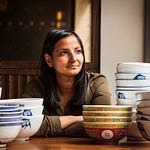This episode is dedicated to my one true love - bread! In it, I talk to three ex-baking colleagues, Gloria Ford (Chef/Baker), Maisie Collins (Hearth Bakery) and Allisa Murphy MacFarlen (CHIB Bakery) about the trials and tribulations of bakery night shifts and how baking and solitude often go hand in hand.
I've put up two recipes alongside Episode 5 - one for a 100% rye baker's loaf and the other for a batch of rye chocolate chip cookies. You can find out more information about Maisie's bakery, Hearth Bakery in Hackney, London and Allisa's micro bakery - since recording this podcast, she has also started working at Outlier Bakery, Glasgow. You can also follow Allisa's illustration based work here.
Episode 5 Transcript: interview with Gloria Ford, Maisie Collins and Allisa Murphy MacFarlen by Julia Georgallis
Julia - Hello, welcome to the How to eat alone podcast, with me, Julia Georgallis. I’m a baker and I write about food.
This podcast explores the art of eating alone and looks at topics surrounding loneliness and aloneness. I’ll be talking to different people about their own experiences of solitude and solo dining. I’ve had to take a little break from recording recently, but from now on these podcasts will be published every other weekend with every episode. I'll share a recipe or two, designed to be cooked and eaten by one person and one person only, because most recipes are written for two or more people.
This episode is dedicated to my one true love, bread, more specifically it’s about baking at night and about baking and solitude and how these two things go hand in hand. I’ve worked as a baker since 2014, working for different bakeries and running my own business, The Bread Companion which I closed in early 2021. The first place that I ever worked was a bakery in Haggerston, East London. I was there for a couple of years and originally when I started there were two shifts. So there was the Dough Shifts, or the day shift and that ran from 9 am - 5 pm - that was where all the dough and pastry would be made. And then there was the Bake shift, or the night shift, and that ran from 2 am - 10 am where the bread would be baked. At some point, it occurred to myself and the bakers who were working there at the time that baking at night might not be the best thing for everyone’s health and actually that it might be quite an antiquated process - the main reason why bakers bake at night comes from a time when the proofing the bread couldn’t really be controlled - but you know, now we have fridges, right, to control proofing and we also have ways of keeping bread fresher for longer, so our shifts were changed and the new bakeshift ran from 4 pm until midnight/1 o’clock. I kinda wonder if this might also be the case in the future for lots of other bakeries and if they might adopt these kinder baking hours and whether true dead of night bake shifts might become kind of extinct!
I think the idea of baking at night has been romanticised throughout time, and sometimes it’s even contributed to history - The Great Fire of London for example which destroyed a significant amount of the city, that started on Pudding Lane in a bakery just after midnight, because, as the story goes, a baker left his ovens on.
And night time baking is also how the croissant got its name - this is one of my favourite food history stories. So in the 1680s, the Ottomans tried to invade Vienna. They crept into the city really early in the morning or really late at night depending how you want to look at it. But, the bakers, who were the only ones awake, alerted the Viennese army and the Ottomans were defeated. The croissant was created to celebrate this victory, the shape of the pastry is a crescent shape, croissant in French is crescent, just like the crescent on the Ottoman flag.
Baking at night has these moments of beauty, you know the world around is sleeping and the streets are empty and it’s quite solitary and you might be alone in the bakery, with only a podcast or the sound of the crackling bread when it comes out of the oven for company - and there is something really nice to it but I personally found it incredibly isolating at times.
I got in touch with three of my old pals who I used to work with - Gloria Ford, Allisa Murphy Macfarlan and Maisie Collins, and I spoke to them about working night shifts and how they feel about working on their own. Gloria is a chef and baker and she was actually the lead baker when I worked with - Allisa is a Canadian pastry chef - she moved to Glasgow to set up her own home bakery. She makes cakes, pastries and bread and she supplies cafes and also runs a baked goods subscription service. She also does a lot of illustration, photography and art work so as you can imagine her baked goods are always really beautiful and so much personality. Maisie also trained as a chef and she’s also recently set up her own social enterprise bakery, Hearth in Hackney Wick - Hearth has a mission to provide bakery training for unemployed homeless people and it also, really beautifully, offers up its ovens to the public once a month to the community so that people can head to the bakery and bake together.
I start by talking to Gloria, who, to be honest, remains to this day one of the only bakers I have ever met who loved working in the middle of the night…
Gloria - It was a very peculiar, individual thing the night shift, I think. I look back at the bake shifts, the ones that started at 2 am, not the new bakeshifts, the changed into reasonable hours but the unreasonable ones I look back at them with a lot of nostalgia - bit of the job that I really liked.
Julia - So that’s actually kind of what I wanted to talk to you about, because you're the only one who really liked the original 2 am - 10 am shift. I also liked aspects of that shift but I much preferred the 4 pm to midnight ones but you loved it! Why?
Gloria - It just really fitted in with where I was at the time I think - I was craving solitude - like I really wanted to be working on my own and relished working on my own when I got the chance to because the way that the daytime shifts went, they were very demanding on my social skills and my social skills are not that great. Being able to arrive in the dark to a big empty place and carry myself in whatever way I pleased without having to worry about giving the right impression and then to finish on this glory at the end because you know, everyone would come into the bakery and the first thing they’d see was the bread that had been baked the night before - it meant that I got 6 - 8 hours of working on my own at a pace that suited me and then got to walk out at the end with my head up. It was a great learning, in terms of becoming a better baker. I found it brilliant because each project was yours. I found it the best section of the baking process to get a really really good overview of what actions gave what consequences in terms of the baking science so it was very helpful.
Julia - I don’t know - I liked the shift but it didn't fit into my life and I found myself really isolated when I didn’t really want to be - because I was living on my own at the time - it just kind of meant that if I did do a few days of nights shifts during that time I didn't see anyone and it was really lonely.
Gloria - Yeah, no, I found that too but I think I wanted that.
Julia - Maisie comes at night shifts from a different angle - she doesn’t agree with them necessarily, but she doesn’t hate them either, as they give her the space, I suppose, to work alone - in fact, I think she sees them more as an act of duty, something that she has to do to get her new bakery to work…
Maisie - I’ve done a lot of crazy hours, up until this bakery I hadn’t done any overnighters. It just never appealed to me and, in all honesty I just thought it was something I was never going to be capable of because of knowing how my brain works and knowing how much I rely on sleep, but I’ve done crazy chef jobs where I’m doing like 90 hour working weeks, where you’re in at 6 and leave at 11 then back up at 6 - that’s gross. But I’ve left that part behind and then it's only now that I have started my own business that I’ve picked up a few gross hours again - the worst one was when I worked from 6 am until 4 am the next day. With a 20 minute break. And I don't know how my brain continued to function the next day or how I functioned or how anything actually got done but it did through sheer stubbornness and willpower...
Julia - And also because it’s your own thing - you just push on through.
Maisie - I think that was basically the driving force - knowing, even though it is my own thing, it’s not just me that I’m supporting by doing that, it’s all of the staff as well - at that time we didn’t have many bakers and we couldn’t afford more bakers so doing that was contributing to future bakers. I definitely had a weird enjoyment of doing the shifts, in the early days, where I was doing night shifts, and it’s like driving at night when the windows are down, like having that weird refreshing feeling - I basically binged podcasts and had a space to myself where I could really just crack on and get a lot done. I am naturally an introverted person. I really enjoy being by myself. I would rather have a night in than a night out and in terms of working I always find like a weird calmness in it if I’m speedily but calmly and mindfully making something. I think that’s a really nice process. I think the thing about baking at night is that it's all kind of rhythmic and everything is done in a certain order and done at a certain time and it's almost kind of meditative in that way and you’re kind of moving to a certain pulse and then at the end of it you’ll end up with something lovely. And there’s something always really satisfying about being the last person to close down the kitchen because it’s clean and it’s going to stay clean for several hours.
She laughs
Julia - Allisa, on the other hand, didn’t do too many of the 2 am night shifts, she, as many other people I think would agree with, didn’t really enjoy them…
Allisa - I did it three times I think the 2 - 10, and, I dunno, I’m not that kind of worker, also I was living in Kentish Town at the time when I did that and riding my bike so it was a bit of a weird thing to go to bed at like 5 pm to get up at 1, to have a coffee and get to work on your bike in dark London - it was a bit of an odd experience and also I was fairly new to the city so it was a bit of a confusing time. But I liked the principle of it - when I started doing the 4 - 12s, I really enjoyed that shift because you’d work with people at the beginning and then everyone would sort of trickle out of the building by about 6 and then you have your music and you check the fridges to make sure the bread was proving at the right times and it was really exciting. I liked that. It is nice to be working by yourself at least for me I find it can be a little easier - I can manage my time a lot better and I'm not distracted by other people so I can just put my head down and work - either if it’s baking bread or making 24 pastry cases or whatever the task is, I think it's nice to not have that distraction - you know exactly what you have to do you can lay everything out you don't have to answer questions. You can just go. I enjoy doing it on my own because I enjoy seeing the whole process from beginning to end, I like getting the ingredients myself, sourcing them myself knowing where everything comes from. I like writing my own to-do list.
She laughs.
And I think the thing that I appreciate the most is I know what I have to do I’m not getting surprised with a new task all of a sudden because, working in a restaurant, if lunch service was really busy and you have to make then more for dinner but you have a whole other list of tasks it can be quite stressful so i think my stress is way lower because I know exactly what I'm doing every day.
Julia - So this rhythm of baking that Allisa and Maisie refer to, whether it’s during a dayshift OR a nightshift and the way that your day needs to be set out to make bread, I think does provide some kind of stability, working in a kitchen cheffing IS much more stressful, I can tell you that as well, it’s more stressful than baking, as Allisa says. Maisie has also found that bread has given her this foundation which she can structure her life around…
Maisie - It’s really helped me find some kind of stability with what I want to do - and where I want to be and I think being a chef is great but it’s a lot of instability and not just from crazy hours and all those horror stories but from constantly menu planning and constantly having to move and run around and catch up the seasons, I feel like with bread you're in control of something the whole time and that’s a really nice feeling to have.
Julia - I don’t have any scientific research to prove this, and I haven’t done any big official studies, but in my 7 years of baking, I just generally find that bakers are a lot more solitary in comparison to chefs. Like I said, I’m not saying there aren’t any really chatty bakers who are super extroverted, but to chef is to work in a busy, noisy kitchen, in a big team perhaps and be the overseer of lots of different processes that are brought together on a plate - but when you’re a baker, you’re the overseer of just one process, of just one element. Making bread is a bit of an escape. When you’re baking at night, it really does feel like you are separate to the rest of society… Gloria agrees.
Gloria - I felt like I was living on a different planet.
Julia - Yeah and that kind of living on a different planet I quite liked because I liked going against the commute in the morning for example, everyones going to work and I was coming back from it, I liked that.
Gloria - Thinking of that that there’s a massive downside on the other end of that which is that at the beginning of the shift which I really - when I first started doing the bake shifts if was not long after I’d crashed out of a couple of years of really hard partying and to get to Haggerston for a 2 am start, I had to get a night bus through shoreditch just as the pubs were turning out, at like 1.30ish and I found that really, really difficult - not any longer, being part of this night time world. Like I was still awake and active at the same times I would have been if I’d been partying but I was starting a shift at work, being surrounded by people who are literally on another planet.
Julia - Yeah - a totally different headspace to where you are. I was thinking about it and because obviously we were working in Haggerston and during the day it's also quite busy and there's a lot of people working there's loads of offices and studios around there but then at night it’s like the people who are around just totally change. That whole street where our bakery was, was just full of drug dealers...
Gloria - It was a strange… yeah, it was funny street.
Julia - Whereas during the day it’s super residential and kind of really focused and people are working and then at night its dealers and then you see the other people doing the night shifts as well, like the supermarket workers and whoever else is about.
Gloria - On the times I’d get the bus all the way to work from where I was in Vauxhall, particularly when I was a little bit late so starting at 2 o'clock, it would be party people that you'd bump into but as you got more into whatever you call them... there must be a romantic name for them the hours between 2 and 4... that's when you see people catching up on sleep between shifts and stuff - really the unseen workers of London - I always imagined when I saw most people that they were cleaners but I imagine that some of them were actually bakers, there was more than one bakery!
She laughs
Julia - It's funny - the other people who are doing night shifts - it’s bakers, it’s doctors, it’s firemen, policemen , cleaners, supermarket workers, lots of merchandising as well...
Gloria - So much happens outside of opening hours - I remember finding tremendous kinship with the postman when I was doing night shifts. I remember because I did them for a couple of months and of course got kind of depressed because that’s what night shifts do to you and I’d often see the postman when I came home and I remember telling him I’d just come off a shift and having a really lovely conversation where we just really found lots of identification with each other and we could just sort of look at each other shadily from underneath the hoods of our eyes.
Julia - I got depressed because that’s what bakeshifts do to you - what Gloria just said is the biggest problem with night shifts. Everyone who does them or who has had to do them knows. They are terrible for you both physically and mentally.
Gloria - Do you remember always feeling very very cold when everyone was hot?
Julia - No, I remember the opposite actually - I know it really affects your hormones.
Gloria - Yeah, that fits with my experience I think - you were so deathly tired at the end of it because the sleep that you can get, I think, from when your doing night shifts and you’re sleeping outside of night time hours with all the eye masks and blackout blinds that you can find, I still don't think you really can get the same kind of shutdown that you do when it's dark and when the world is quiet. I'm not sure there is anyone who night shifts suit biologically - I think night shifts suit a number people because it means businesses can operate in a certain way and it means that if you want to be working two jobs or if you've got something that means you can’t work during the day that means you can't work during the day then you can still make a living, but I'm not sure there's really any proper goodness to be had from them. No matter how 24 hour you make the world we still do operate on very much a night falls this happens, day time starts, this happens. But I think there's definitely an onus of finding ways as an employer to protect people working night shifts.
Julia - Cue Maisie, a new employer who is fiercely trying to protect her staff from working bad shifts.
Maisie - I’m basically trying to build a nice hospitality place based off of all the bad experiences that I’ve ever had in jobs and doing the opposite of that, so everybody who has a shift tends to work in the same time zone until they’ve had two days off. So if you’re a baker and you’re doing the 6 am - 3 pm shift the next day you won’t be doing the 9 am - 6 pm shift. So you have some kind of stability in your sleep pattern. We did have a night shift which we have stopped doing for now - we don’t need it right now but we are intending on picking up more wholesale which will then have a 3 - midnight shift. It will be quite nice and like enough time to hand over with the other bakers and get some human interaction before being left to it - it’s important that we don’t do any overnight shifts because I think in the long run they’re just not sustainable. You just end up feeling so jet lagged and I don't think you should be asking anyone to be doing those kinds of hours.
Julia - Maisie’s mission definitely comes from working too many bad hours over her career, but I kind of also think perhaps employers offering nicer more reasonable working hours and generally being more clued up about not seeing human beings as work machines is a lasting legacy that the pandemic will leave on the way in which we work. You know and also for the employee, we don’t want to work bad hours anymore and Allisa also has this attitude to how she wants to work for herself in the future - I ask her what her hours are like now that she works for herself instead of in a kitchen.
Allisa - Oh, they’re all over the place. It's hard to schedule in time off because, I mean you know this, when you start running your own business or businesses there so many things that need to get done, so I don't really feel like I have a schedule, I try to stick to the 9-5 working hours because I like to be able to have a point in the day that I finish, so 5 pm I like to be on the couch with a glass of wine, so I don't ever want to get to the point where I’m working beyond my plan, but it's hard because like bread, you have to be on their schedule, so sometimes it doesn't work that way.
Julia - So no more night shifts or there are some night shifts?
Allisa - Oh I have to get up early for sure - but like my commute is very short.
Julia - Yeah, go downstairs!
Allisa - So that's when it becomes great, is when I know I have to get things out of the fridge by about 4 to have things ready to go by the time i need to go deliver them so still have an early rise time but my commute is just to the kitchen where there’s coffee and I can wear my pyjamas.
Julia - I think one of the things that isn’t often discussed is eating on a night shift. If there are no main meals in the small hours, then what do people who work in those small hours eat?
Gloria - My therapist gave me some really useful advice when I started out doing nights shifts - she kept on talking about flight attendants and the training that they’d have to try and stay adaptive and flexible with all the time zoes they go through and the key thing was, that trying keep your meal times and what your meal consists of, like if it's more breakfasty or dinnery, trying to keep them as regular and as like the rest of the world as possible.
Julia - I did that, that was how I managed. I don't think I would have managed any other way if I hadn’t kept my meals consistent.
Gloria - I remember we talked a lot about sugar at the time.
Julia -
I never drank caffeine or ate excessive amounts of sugar when I was doing those shifts because I found it made me tired-er.
Gloria - I drank an astonishing amount of tea during a shift - I think that did me a lot of harm, though it was the only refreshment that you had at hand. When you’re working in a kitchen as a chef you’re tasting all the time - you might not sit down to eat but you’re entertaining your mouth, whereas in a bake shift its just loads of flour.
Julia - And like carbs, like sugary carbs
Gloria - Oh yeah, the cookies
Julia - Yeah, the cookies - those cookies did me in, damn those cookies
Gloria - I think if I was going to set up a bakery now, they’d be a buffet fridge…
Julia - Full of nutritious salads.
Gloria - I’d quite like to do it again, I really fancy some night shift.
Julia - There's stuff you don't do when you get older and you have a bit experience and I think night shifts might be one of them. Cos I was what? 27? When i was doing those shifts - it’s not that long ago but the energy I had was totally different.
Gloria - It's very telling that once you get out of it how difficult to get back in again physically, how it feels so much more much to much, even after a few years after we’ve stopped doing, I think that’s really telling of how hard it is. But you know, we have many more years of working ahead of us and I kind of feel like my last night shift is not done.
Julia - Yeah, I don't think my last night shift is done either.
Gloria - I’m looking forward to it, if I’m honest - I feel tempted to get off this call to go and look for baker jobs.
Julia - Do it!
So there you have it - the bake shift. You can hear from all of us that there’s a soft spot for it. Next time you buy a loaf from your local bakery, why now as the bakers about the process. Ask where your bread was made, how and when that loaf was made and who was it made by? It might spark a really interesting conversation, not just about bread making but also about how we look after the people who make our food.
I’ve put up two recipes - one is for a baker’s loaf - so a baker’s loaf is usually a small loaf of bread made using excess dough, it would traditionally be baked by the baker on their bake shift and taken home by them to eat at breakfast time. I’ve given you a recipe for a 100% rye, which is much quicker than a sourdough white loaf, time is quite important if you’re a solo cook.
I’ve also given you a recipe for those deadly chocolate chip cookies that Gloria and I would eat on our 2 am shift. I suggest making a normal batch of cookies but freezing the dough and just baking one or two off whenever you feel like a sweet treat. I think it’s kind of nice for the solo cook to have a stash of cookie dough somewhere in the house.
You can find both these recipes and more information about this podcast, including all the links to all the bakers’ work at howtoeatalone.substack.com. There’s also an option to subscribe to my substack - there are both paid and free options and subscribers gain access to more articles, more recipes and generally more things about eating alone. Follow the podcast on instagram, the handle is @howtoeatalonepodcast. And if you like this podcast, share it with someone who you think might also like it! I’d like to thank Gloria, Allisa and Maisie for talking to me and I’d like to thank you for listening to this episode and supporting this pod. I hope you enjoyed being alone with me and I’ll see you next time for the next episode of 'How to eat alone..'
Find out more about 'How To Eat Alone' here.
Find out more about podcast host, Julia Georgallis here.
Music
Ben Beiny
What's Cooking
https://www.premiumbeat.com














Share this post